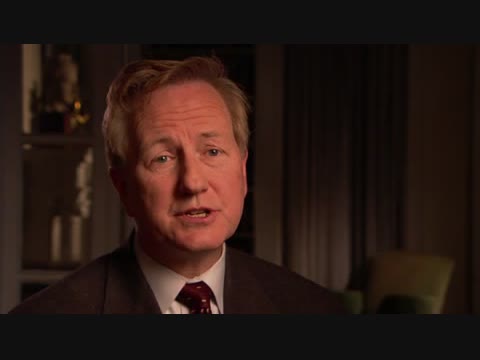American Experience; Stonewall Uprising; Interview with William Eskridge, 3 of 3
- Series
- American Experience
- Episode
- Stonewall Uprising
- Raw Footage
- Interview with William Eskridge, 3 of 3
- Producing Organization
- WGBH Educational Foundation
- Contributing Organization
- WGBH (Boston, Massachusetts)
- AAPB ID
- cpb-aacip-15-52w3t5cd
If you have more information about this item than what is given here, or if you have concerns about this record, we want to know! Contact us, indicating the AAPB ID (cpb-aacip-15-52w3t5cd).
- Description
- Episode Description
- In the early morning hours of June 28, 1969 police raided the Stonewall Inn, a popular gay bar in the Greenwich Village section of New York City. Such raids were not unusual in the late 1960s, an era when homosexual sex was illegal in every state but Illinois. That night, however, the street erupted into violent protests and street demonstrations that lasted for the next six days. The Stonewall riots, as they came to be known, marked a major turning point in the modern gay civil rights movement in the United States and around the world.
- Raw Footage Description
- This footage consists of an interview with William Eskridge, Professor of Law.
- Date
- 2011
- Rights
- Copyright 2011 WGBH Educational Foundation
- Media type
- Moving Image
- Duration
- 00:05:30
- Credits
-
-
Producing Organization: WGBH Educational Foundation
- AAPB Contributor Holdings
-
WGBH
Identifier: cpb-aacip-76db42c8873 (Filename)
Format: DVCPRO: 50
Generation: Original
Duration: 00:05:30
If you have a copy of this asset and would like us to add it to our catalog, please contact us.
- Citations
- Chicago: “American Experience; Stonewall Uprising; Interview with William Eskridge, 3 of 3,” 2011, WGBH, American Archive of Public Broadcasting (GBH and the Library of Congress), Boston, MA and Washington, DC, accessed August 31, 2025, http://americanarchive.org/catalog/cpb-aacip-15-52w3t5cd.
- MLA: “American Experience; Stonewall Uprising; Interview with William Eskridge, 3 of 3.” 2011. WGBH, American Archive of Public Broadcasting (GBH and the Library of Congress), Boston, MA and Washington, DC. Web. August 31, 2025. <http://americanarchive.org/catalog/cpb-aacip-15-52w3t5cd>.
- APA: American Experience; Stonewall Uprising; Interview with William Eskridge, 3 of 3. Boston, MA: WGBH, American Archive of Public Broadcasting (GBH and the Library of Congress), Boston, MA and Washington, DC. Retrieved from http://americanarchive.org/catalog/cpb-aacip-15-52w3t5cd
